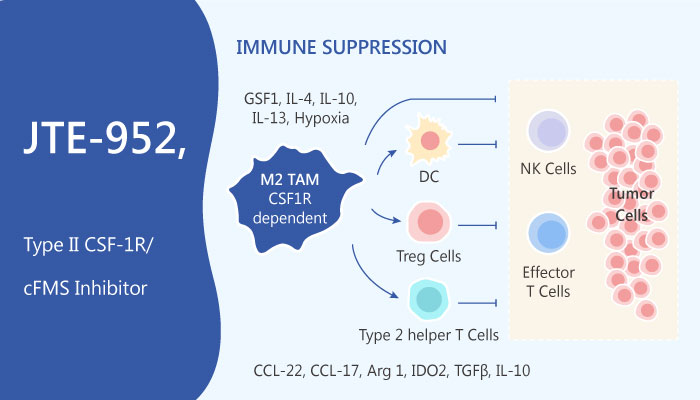The colony stimulating factor-1 receptor (CSF-1R or cFMS) is a type III receptor tyrosine kinase. It activates via binding CSF-1 and IL-34, stimulating differentiation, proliferation, survival and migration of monocyte-macrophage lineage cells. In addition, macrophages produce inflammatory mediators such as interleukin and lymphokine, and lead to proliferation and activation of various immune cells. Also, the signaling promotes differentiation of osteoclastic precursors into mature osteoclasts, promoting bone destruction and bone absorption. A study from Kazutaka Ikegashira, et al. discovered a novel CSF-1R inhibitor JTE-952 with high kinase selectivity.

There have so many CSF-1R inhibitors reported in many studies, including Ki20227, GW2580, BLZ945 and AZD7507. What’s so special about JTE-952?
As we all know, many kinase inhibitors bind to the ATP-binding site of kinases. However, because all kinases have an ATP-binding site, kinase selectivity is difficult to achieve. Type II inhibitors such as Imatinib and Sorafenib, which induce the inactive DFG (Asp-Phe-Gly)-out conformation and also occupy an additional hydrophobic pocket created by this rearrangement, are well known as a solution to obtain increased kinase selectivity. And JTE-952 is a typical type II CSF-1R inhibitor with excellent kinase selectivity, with IC50 values of 261 nM and 13 nM for TrkA and CSF1R, respectively.
Furthermore, JTE-952 (3 mg/kg, oral, once-daily) treatment reduces the overall progression of the clinical score. It includes inflammation and bone erosion in mouse model of collagen-induced arthritis (CIA model).
In a word, JTE-952 is a promising clinical candidate with high cellular activity and good pharmacokinetics profile. But there is still a lot of work to do.